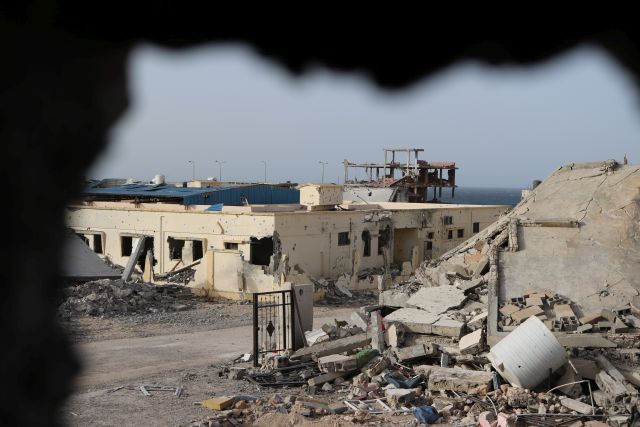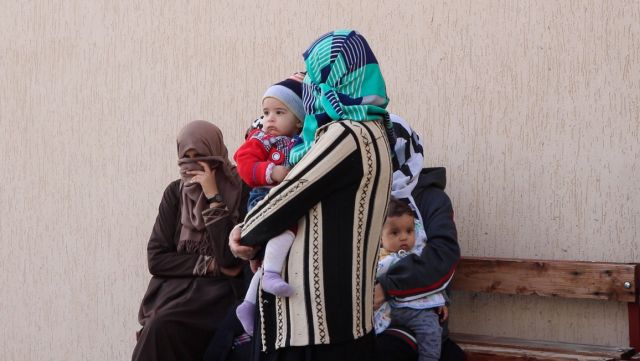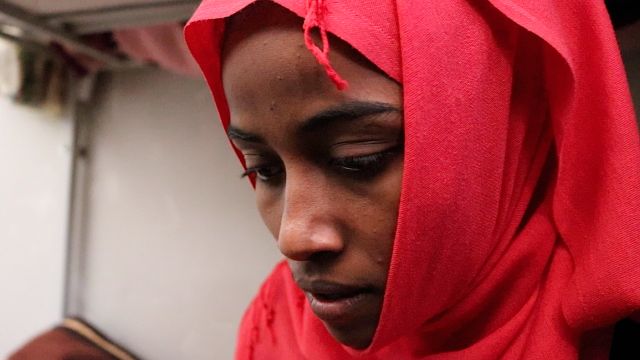When ISIS was defeated in Sirte in December 2016, dozens of women and children held hostage by the terrorist group thought their nightmare was over. Some of the enslaved women had managed to escape during the terror group’s almost two-year reign in Libya’s central coastal city but those who didn’t had to endure the siege on the coastal city on top of the tyranny of the so-called Islamic State.
“We could have ended the war weeks before we did, but dozens of women and children were trapped with the terrorists. And every time a group of women came out advancing toward us, our men were afraid it was a trap ” said Abu Bakar, a fighter with the Hariga Brigade, one of the armed groups that fought the group for seven months in Sirte as part of a coalition led by the city of Misrata.

Nov. 29, 2016 – Frontline in Sirte: glimpse on the area held by ISIS in Sirte
Several soldiers fighting against the terrorist group were killed or injured in these attacks in the dying days of the war, especially around Jiza Bahriya, the last hideout of the Caliphate before Libyan forces retook control over Sirte last December.
ISIS female combatants would infiltrate fleeing civilians and then detonate wearable explosives when they were close enough to fighters from the anti-Isis coalition. The trend compounded the complexity of the humanitarian crisis surrounding the civilians trapped in Sirte.
“Some of them were in a very bad state… some infants were severely malnourished and dehydrated. They were given first aid and then were taken to Misrata’s main hospital,” a doctor at a field hospital in Sirte told Migrant Report.
But more than two months after the war ended, the ordeal is far from over for some 80 surviving women and more than 50 children from Libya, Tunisia, Niger, Syria, Iraq and Eritrea.
After they recovered, they were taken to a prison inside Misrata’s Air Force Academy and this is where they still languish as authorities try to determine whether the adults were prisoners or willing members of the terrorist group, Ali Abusaid, a volunteer with the Libyan Red Crescent confirmed.

Nov. 30, 2016 – Arab women previously enslaved by ISIS in Sirte, are today detained in Misrata
Among those held, are a group of Eritrean migrants, who were kidnapped while on their way to the Libyan west coast, where they were hoping to board a boat for Europe.
“I entered Libya through the desert on June 2015. We were on our way to the coast, but near Sirte ISIS men captured us” said Audit one of the abducted women. Sitting on her bed on the first floor of the prison in Misrata, the 27-year-old said she left Eritrea in 2014, and for almost a year she remained in Sudan before crossing the border into the North African war torn country in the hope to move on to Europe.
The day after Audit and her traveling companions were captured by fighters of the Islamic State, the group was divided. The women were grouped together and taken to a house in Sirte and abandoned there for two days after which the militants returned with copies of the Quran, demanding that they read it and convert to Islam.
Some asked about the fate of the men they were with. “We will slaughter them at the port as they are infidels,” came the chilling response. “A pregnant woman begged the man to spare her husband for the sake of the baby in her womb, but he just told her that any Christian was a dirty infidel”. Audit paused her narrative to wipe the tears streaming down her face as she recalled the details of those early days in captivity.

Nov. 30, 2016 – One of the women previously enslaved by ISIS in Sirte and today detained in Misrata
Audit was part of a second group of East African migrants kidnapped by ISIS near Sirte, shortly after they took over the coastal city in the spring of 2015. The first group was abducted in March, more or less in the same area, while Audit and her group were taken three months later in June. In both cases, the men were killed and those in the first group ended up in one of the Islamic State’s infamous execution videos.
The day after they learnt about the gruesome fate of the men, the women confirmed why they too had not been taken to be killed. A group of ISIS fighters returned to the house and “each man chose the women he wanted. Some of us cried and they beat them up”.
Audit was one of the prisoners turned into a sabaya, a concept invented by ISIS to justify the enslavement and rape of women they hold captive in their territories. “The man who picked me, locked me inside a house somewhere in Sirte. I was alone and he used to come to bring me food supplies once a week. Each time he visited, he raped me” Audit recalled, looking downwards.
“One day he brought another woman and told me she was his new wife. We were together for a few weeks, just me and her. Then the fighting began, and the fighter took us to another building where there were dozens of women and 48 children, cold and starving” she said.
The anti-ISIS campaign was launched last May by Misratan forces supporting the government of Fayez Serraj, brokered by United Nations. Operation Bunyan Al Marsoos declared victory on December 6, 2016. Since then the city of Sirte started welcoming back families who had fled ISIS or had been evacuated during the conflict.
“I consider myself still lucky as I did not get pregnant” Audit says as she compares her situation with that of some of the women with her in the Misurati jail. Awares, 16, Eritrean, was not so lucky. “I have in my womb a son of the third ISIS fighter who married and raped me. But I want to have an abortion. ISIS disgusts me and I don’t want to give birth to an ISIS son. I don’t care if the surgery might damage my health”.
Adjusting her veil up over her nose to show only her eyes, a 63-year-old Filipino woman, cried before the main gate of the prison’s long corridor: “I don’t know what we’re do here yet. I understand that Libyan authorities should investigate, but we are here for three months so far, and I think it’s clear that we are the victims”.
She was taken prisoner along with a group of co-nationals who served as nurses at Sirte’s central hospital Bin Sina and forced to continue working under duress. After Libyan forces launched their siege on ISIS in Sirte, they were moved from their guesthouse to an unknown part of town and from where they were made to treat the injured militants.
“We were first forced to convert to Islam and then to treat their wounded fighters and help their women give birth” another former nurse who worked as a cardiac nurse in Libya for 18 years told Migrant Report.
The investigation by Misrati authorities first focused on women from Tunisia, Iraq, Syria and Libya as they were among the last to leave the enclave. Some have been cleared but are still stuck in the bureaucracy. “Our authorities have called on the Tunisian government to accept their women, but Tunisia has yet to respond,” Ali Abusaid told Migrant Report.
The fate of women for sub-Saharan detainees is even more blurry. Once victims of rape and violence, today they are trapped in the legal vacuum in a country with no government or state.



